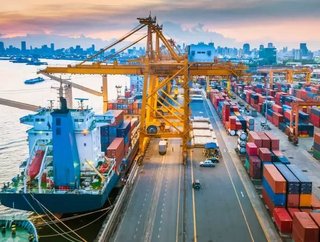Q&A: CargoX Founder and CEO Stefan Kukman

Q&A with CargoX Founder and CEO Stefan Kukman about the disruptive potential of blockchain in logistics, getting the industry to adopt new technology, and how a small startup from Slovenia is taking on the shipping business....
CargoX is a start-up with ambitions of revolutionising cargo shipping, logistics, and supply chain management. However, your competitors are building similar solutions. How is CargoX leveraging its competitive advantage to make its “Smart Bill of Lading” a reality?
We are a small, but very experienced and flexible team with diverse skills. Members of the CargoX team have been active in logistics for a long time. We keep things simple, involving just enough people to make our product easy to use and widely adopted. There’s another important component to our success. Technology companies often lack the shipping and logistics expertise necessary to break into this industry. On the other hand, logistics companies venturing into the tech field may be held back by their reliance on established, old-school business practices.
At CargoX, we have industry veterans from both sectors. We’re also neutral partners, which means that logistics companies can plug-and-play using our platform, without giving up important data and autonomy to big companies that are working on their own solutions. With CargoX, you are always in control.
The solution is comprised of a distributed app, a document exchange protocol, and a governing body, which is currently being established. Can you talk about the response that you are getting from the industry?
We are in negotiation with shippers and logistics companies that want to implement our solution. Bringing these logistics companies on board is the most important part of our business development strategy – we are building the product for them, not for us! That’s why being market neutral is so important. Global trade data is very sensitive – and we need to establish trust with our partners. The next step is to demonstrate the viability of our platform with a test shipment that will set sail in Q2 2018, with an already agreed-upon logistics company and their clients. The test shipment will travel from Asia to the EU.
How easy is it for logistics companies to onboard your technology, and what are the associated costs?
We are working on delivering a painless procedure for companies of all sizes. Every customer will need to register and complete a KYC (Know Your Customer) process, where we will also verify NVOCC licenses to establish roles and permissions on the platform. Once companies register, they will receive their public and private key for signing the Smart B/Ls. This can be done in the Smart B/L distributed application provided by CargoX, or with the help of the CargoX Smart B/L API integrated into the company’s system. Generally, the companies can start using the system within a day, and there will be online training provided, just to make sure everything goes smoothly. When the CargoX Smart B/L API needs to be integrated in the company’s systems, this might take a couple of days, or a couple of weeks, depending on the workflow of the company. CargoX will provide integration services as well, through a network or partners.
How are you working with financial intermediaries such as banks and insurance companies to make CargoX is a widely accepted platform?
In the near future, we plan to roll out other products connected to our Smart B/L. We are developing a Smart Letter of Credit. The shipping industry currently wastes billions of dollars on spending related to letters of credit, which are used in global trade as a payment guarantees. We will announce more details about the Smart L/C in the second half of the year. You are using blockchain technology to digitalise the Bill of Lading. Does that mean all the documents will be stored online in the cloud? Is that safe? All data will be encrypted and stored in decentralised storage (such as IPFS, Storj, or similar). These are much safer than centralised storage, as they use the same blockchain security mechanisms as the billions of dollars’ worth of cryptocurrencies such as bitcoin currently in circulation. Actual ownership will be traded (sent) in the same way people send tokens today, from one wallet to another. To date, and billions of transactions later, hackers have been unable to penetrate the security of bitcoin, and besides – all data will be encrypted as well. We are fully confident that our approach to security is several magnitudes stronger than the existing state of paper B/L transportation and storage.
Can you explain how blockchain technology eliminates the complexity of ports and shipping?
Freight spends a lot of time in limbo on docks and in warehouses, waiting for the Bill of Lading to arrive, usually by courier. By electronically transferring this document with blockchain technology, the document is always on hand. The cargo is released right away to the right party.
Nobody is ever waiting around for the right paperwork, which means that NVOCCs can transport shipments and release them to importers right away, because everybody has visibility of the Bill of Lading. Nobody is waiting for the courier – or paying for one – and the transaction is recorded as soon as there is a handoff. Rather than wait for the right paperwork to show up, we empower the exporter, NVOCC, and importer to communicate directly, eliminating the possibility for lost or delayed paperwork, and there are no outside parties to clutter up the process.
How will you persuade shipping companies to join the CargoX ecosystem?
Actually, this is our primary focus. Given the regulatory complications surrounding shipping lines, we have decided to focus (for now) on house Bills of Lading – those are Bills of Lading issued by NVOCCs. The first step is to make our solution an industry standard. The Bill of Lading exists to establish the legal owner of the cargo, and the demand for that solution is with the NVOCCs. Our Smart B/L lets NVOCCs offer faster service to their customers, reducing costs and other paper Bill of Lading-related pains. Importers and exporters will be able to request our Smart B/L from their forwarding partners. Once importers and exporters realise that they can save hundreds,or thousands of dollars and valuable time on each shipment, they will press their NVOCC partners to use our Smart B/L platform.
Will companies pay for the Smart B/L services with cryptocurrencies, or classic money only?
Our platform will support all the legacy payment options with fiat money, but as we are a startup based on blockchain technologies, we are working on implementing cryptocurrency payment as well. There will be various service levels supported, and there will be additional features and services provided to holders and users of our CXO utility tokens.
What’s your suggestion for companies that are interested?
Where should they start? We encourage them to contact us for more information. We would love to talk to as many companies as possible, and we’re always looking for more partners for testing and developing – we have CXO tokens on hand to share with our partners to get them started, which they may then use for Smart B/L transfers, or hold on to them while CargoX grows.
- Alberto Medina, Founder of Telescope at P&SC LIVE SingaporeDigital Supply Chain
- Why blockchain is vital to managing risk in the supply chainSupply Chain Risk Management
- Blockchain strengthening links in supply chainLogistics
- Ten benefits blockchain brings to supply chainsDigital Supply Chain






